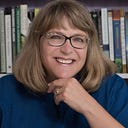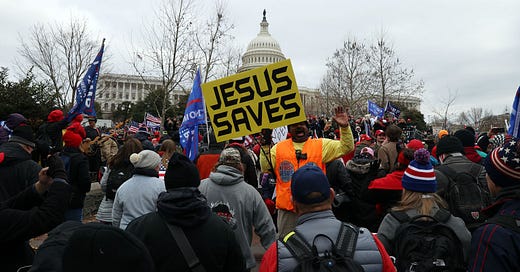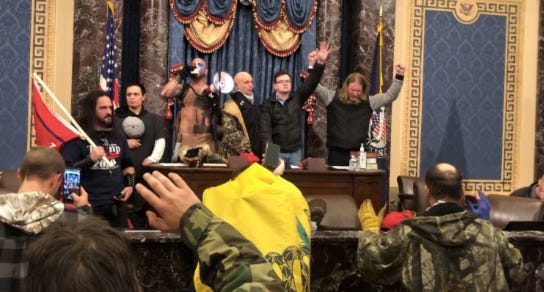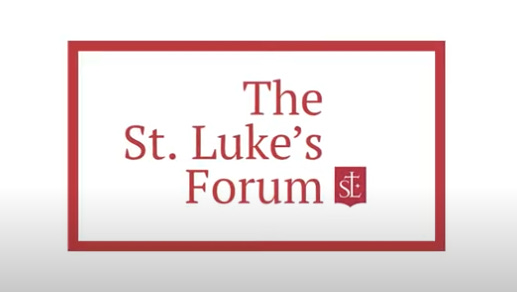

Discover more from The Cottage
A Baptist, a Catholic, and a Neo-Pagan Shaman Walk Into a Bar...
and political mayhem is the result
A Baptist, a Catholic, and a Neo-Pagan Shaman. It isn’t a joke, but it could be a very disturbing development in American religion.
In 1988, Robert Wuthnow, Princeton sociologist of religion, published The Restructuring of American Religion, a groundbreaking work arguing that the decline of denominations had led to a realignment of religion around politics.
For most of the 20th century, the story of American religion had been the story of religious groups — Catholics, Jews, and Protestants (Presbyterians, Methodists, Baptists, Congregationalists, et al) — largely centered on institutional history and conventional religious practices. In the mid-1970s, evangelicals made news by electing Jimmy Carter, and then, in 1980, by founding the Moral Majority. Scholars realized their narrative frameworks didn’t explain the shifting currents of American politics and religion.
Of many books written to explain what was happening, Wuthnow’s proved influential and durable. He insisted that American denominations were splitting into liberal and conservative groups. There’s nothing particularly new with liberal-conservative denominational squabbling, but such arguments had usually stayed “in house.” In the late 20th century, however, people on each side — especially conservatives — were crossing denominational lines and joining forces with like-minded folks in other religious groups, forming two super-alliances of faith and politics. Thus, conservative Catholics, Jews, and Protestants formed common cause around certain issues; likewise liberals formed the same. One of the results of this political restructuring of American religion was — and this was a new phenomenon at the time — a liberal Baptist had more in common with a liberal Catholic and a liberal Jew than she did with a conservative Baptist; and a conservative Presbyterian found comradeship with a pre-Vatican II Catholic or an Orthodox rabbi rather than a liberal Presbyterian.
Wuthnow’s thesis — that American religion had been restructured along liberal and conservative lines — certainly explained the rise and power of the Religious Right and arguments over issues like abortion, LGBTQ inclusion, and women’s rights in politics and in churches and synagogues. We’re still living with the cultural fallout of that restructuring.
I’m convinced that Wuthnow’s framework — a persistent narrative analysis — no longer works to explain American politics and religion.
On January 6, we did not witness the old Religious Right at the Capitol. Instead, we saw three streams of religion, forging a new alliance.
They weren’t “conservative” per se (even if certain familiar conservative issues were in play). Instead, they were hyper-authoritarian, nationalist, and apocalyptic versions of white Catholicism, white evangelical Protestantism, and white pre-Christian European folk religions joined together to advance a shared vision of American identity and political power. And together they represent a kind of cleavage within the old Religious Right, one that is similar to the split in the Republican party.
Of these three streams, I suspect many people are at least vaguely aware of the anti-Pope Francis movement currently roiling American Catholicism; and one would have to have been living under a rock for the last four years to not have heard of Trump-QAnon Evangelicalism. However, I’m confident that the appearance of a neo-Pagan shaman with tattoos and animal skins leading a charismatic prayer meeting in the Senate chamber caused more than a few dropped jaws. The shaman’s appearance at the riot is evidence of a growing mystical-European nationalism making inroads in some New Thought and spiritual-but-not-religious circles.
Was January 6 a kind of preview of a new restructuring of American religion? Is the old left-right divide is now divided within?
Certainly, we’ve seen a rebirth of the Religious Left in the last four years — especially around leadership of black churches regarding race. But the re-emergence of the Religious Left has brought criticism from the more secular left, who don’t want any sort of religious-political alliances. (I see some rough roads ahead here, mostly because secular voters are a major part of the Democratic coalition.) The old Religious Right seems to be devolving into anti-Trump and Trumpist factions, with the latter group’s remix of Catholicism, evangelicalism, and neo-paganism a genuine surprise.
So, the Religious Left/Religious Right is an increasingly dated framework — we’re going to need a sharper lens to see the challenges that face us in this re-restructuring of American religion and politics.
We’ve got a lot of work ahead. And it calls for courageous clarity and creative analysis of the shifts in religion and culture that we’re living through right now.
On Sunday, January 24, I talked about these three streams of religion and the challenge this restructuring presents to faith communities and American politics.
For a robust and insightful conversation, hosted by the Rev. Ed Bacon and St. Luke’s Episcopal Church in Atlanta, on the ideas presented in this issue of the Cottage. Please take some time and listen in — I believe this is a very important discussion. Click here, or on the picture below:
INSPIRATION
When we least expect it, life sets us a challenge to test our courage and willingness to change; at such a moment, there is no point in pretending that nothing has happened or in saying that we are not yet ready. The challenge will not wait. Life does not look back.
― Paulo Coelho
In the unlikely story that is America, there has never been anything false about hope.
― Barack Obama
People are trapped in history and history is trapped in them.
― James Baldwin
Religion. It's given people hope in a world torn apart by religion.
― Jon Stewart
The very nature of our thinking and our behavior takes place in terms of symbolic boundaries. Otherwise, we would be unable to make sense of our worlds, not to ourselves or anyone else. . .And rather than consisting merely of the nuts and bolts of social interaction, they include symbolism, ritual acts, gestures, discourse, moral obligations, commitments—all the things we usually think of as important when we speak of religion.
— Robert Wuthnow
A Gift for the New Year: GRATEFUL FOR JANUARY 2021
To start the year right, I invite you to strengthen your practice of gratitude. My video course Being Grateful in Difficult Times is now available at a discount of 21% during January 2021.
There are lectures based on my book Grateful, mini-practice sessions, and inspiriting interviews with other authors, musicians, and activists sharing their passion for gratitude.
You can preview and buy for the course here. Enter code: JAN21 at checkout for the discount.







Diana, thanks for your weekly newsletter. It's alway insightful. On shifting religious and political sands, I recommend The Upswing by Robert Putnam, a very in-depth look at trends since the Golden Age 1880"s and comparisons. He notes that politics is a bigger factor now in marriage partners than faith or race. Other comparisons ( I have not finished the book yet) would lead me to believe that big money has been pulling the strings of political, racial, and economic divisions in this country for a long time. It has been the most overlooked source except by the extreme left recently although he points out that politicians of both parties at times of more than a century have warned of consolidation of economic power and both parties until recently have voted for "progressive" tax and welfare programs.
Loved loved your conversation with Ed Bacon. I had no idea how "religious" the insurrection was. Maybe I was just not wanting to pay attention. I am wondering about the "secular" left. I am deeply connected into the contemplative movement and began that journey with other more psychological modalities. What I see all around me are young people claiming "no affiliation" but yearning for a connection to authentic experience of the divine / energy / God / universe / meaning ......
Would you call these people secular?